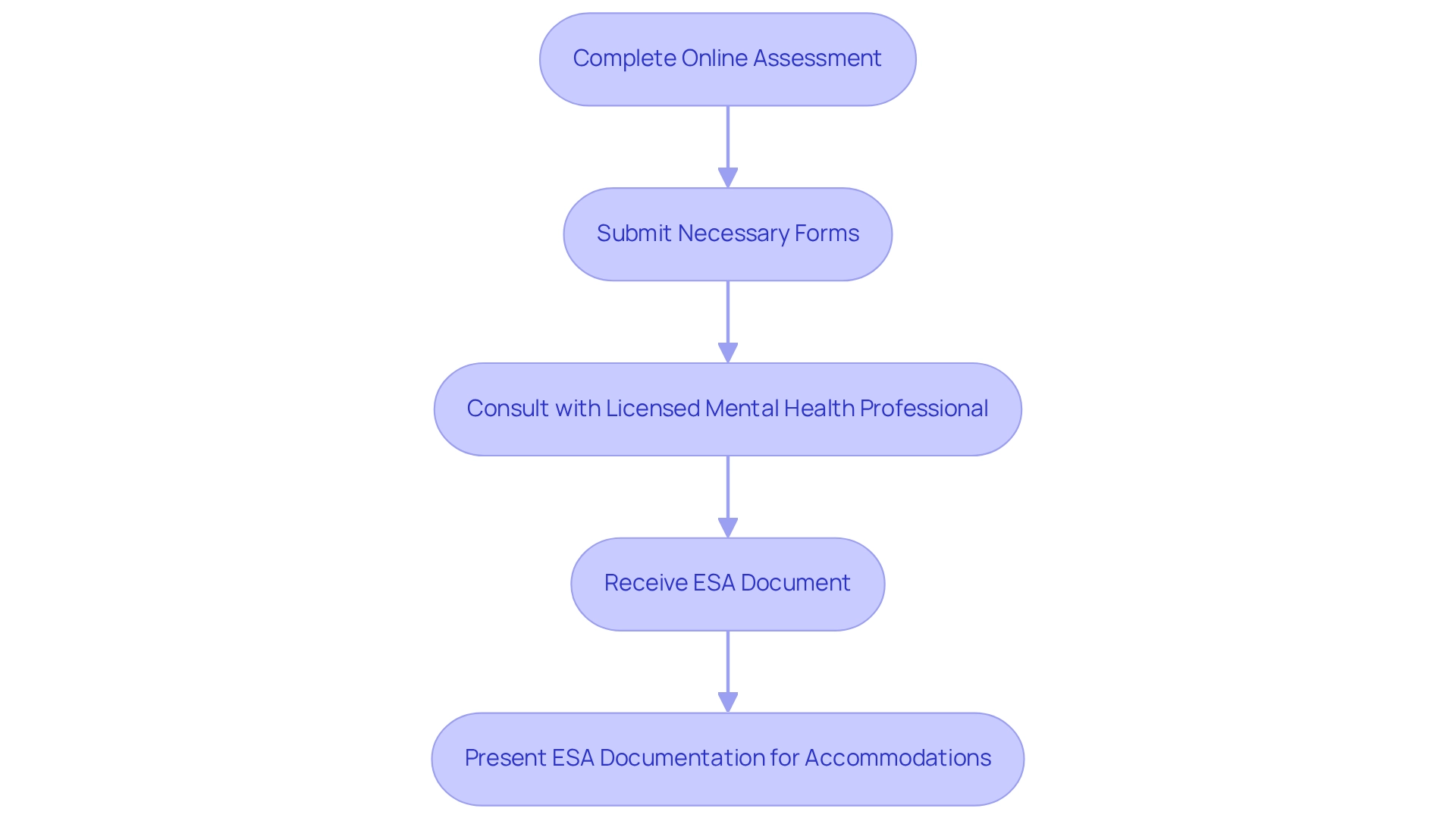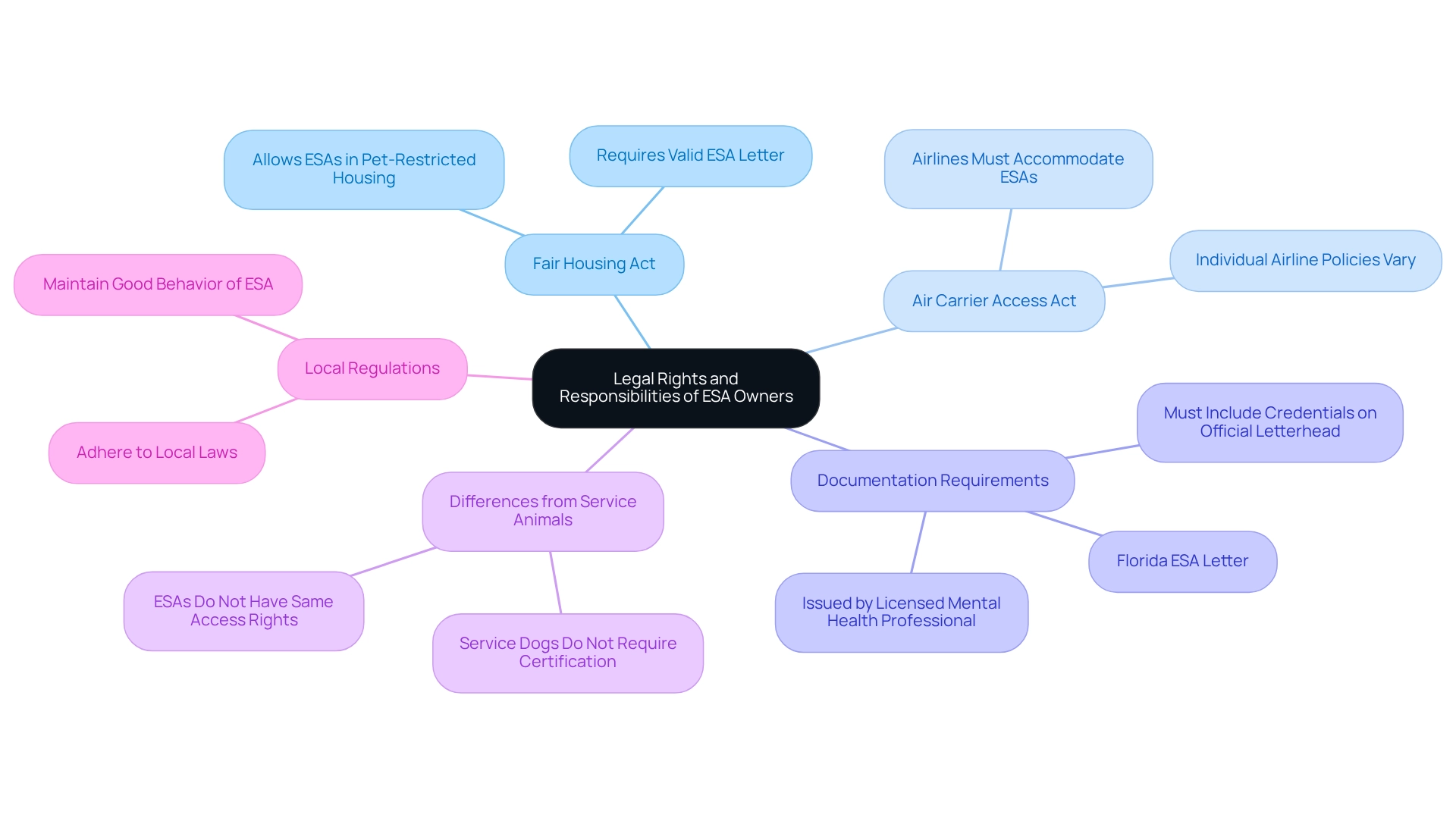

4 Steps to Obtain Your Florida ESA Letter Easily
by Lena Park
Last updated: June 25, 2025
Verified and Approved by:
Angela Morris,
MSW, LCSW
Fact Checked

Overview
The article presents a compassionate four-step process for obtaining a Florida ESA letter. It begins by recognizing the emotional struggles faced by individuals dealing with mental health challenges.
- Consulting a licensed mental health professional is the first step, allowing for an assessment of eligibility based on diagnosed conditions.
- This process not only provides support but is also backed by legal frameworks that protect the rights of ESA owners in housing and travel.
- It’s crucial to emphasize the importance of proper documentation, as it ensures access to necessary support and compliance with state regulations.
- By understanding these steps, individuals can feel reassured that help is available, fostering a sense of hope and connection.
Introduction
In the vibrant state of Florida, many individuals face emotional and psychological challenges that can feel overwhelming. For those grappling with anxiety, depression, or PTSD, the journey can be isolating and daunting. However, emotional support animals (ESAs) have emerged as vital companions, offering comfort and companionship that can significantly alleviate these burdens. Unlike service animals, ESAs provide a nurturing presence, helping to ease the symptoms that often accompany mental health struggles.
As the legal framework surrounding ESAs continues to evolve, understanding how to obtain an ESA letter becomes essential for those seeking the therapeutic benefits these animals can offer. With the number of registered ESAs on the rise and growing recognition of their positive impact on mental health, it is important to explore the eligibility criteria and the step-by-step process for securing an ESA letter.
This article aims to shed light on these aspects, highlighting the importance of emotional support animals while emphasizing the need for accessible and legitimate services in this domain. By delving into the legal rights and responsibilities of ESA owners in Florida, we hope to reassure readers that support is available, and they are not alone in their journey toward healing.
Understand Emotional Support Animals in Florida
In Florida, an emotional support creature (ESA) serves as a comforting companion for individuals grappling with emotional or psychological conditions. Unlike service animals, which are specifically trained to assist with a handler’s disability, ESAs primarily provide companionship. This companionship plays a crucial role in alleviating symptoms associated with mental health issues such as anxiety, depression, and PTSD. Understanding this distinction is vital, as it shapes the legal framework for obtaining a Florida ESA letter.
To secure a Florida ESA letter, individuals are encouraged to consult a licensed mental health professional who can assess their needs and provide the necessary documentation. This document acts as official proof of the individual’s requirement for a Florida ESA letter, allowing them to live with their pets in environments that may otherwise impose pet restrictions. Wellness Wag supports this journey by ensuring swift delivery of Florida ESA letters, typically within 24 hours of approval, so clients can receive their vital documentation without delay.
Recent updates in Florida highlight the importance of adhering to these legal requirements. Misrepresenting an ESA as a service creature can lead to penalties, classified as a second-degree misdemeanor. This legal structure is designed to uphold the integrity of service creature designations and prevent misuse of the system. A case study illustrates this need, emphasizing the importance of accurately representing service creatures to maintain the system’s integrity.
As of 2025, the number of registered emotional assistance animals in Florida continues to rise, with recent statistics revealing a significant increase in recognition of their positive impact on mental health. Expert insights reinforce the profound benefits of pet ownership for individuals facing mental health challenges. Jonalyn Dionio eloquently states, “Pet ownership has a profound impact on mental illness.” This statement underscores the necessity for accessible and legitimate ESA services. Additionally, ongoing research is crucial to deepen our understanding and expand the benefits of ESAs and service dogs, highlighting the evolving recognition of their role in mental health support.
Determine Eligibility for an ESA Letter
To qualify for a Florida ESA letter, individuals must have a diagnosed mental health condition that significantly impacts their daily life. Common conditions that require an ESA document include:
- Anxiety disorders
- Depression
- PTSD
Consulting with a licensed mental health expert is essential, as they will assess your mental health background and determine if an emotional support animal would provide therapeutic benefits. This assessment is crucial, ensuring that the ESA document is based on a genuine need.
An Emotional Support Animal offers comfort by alleviating symptoms related to mental health conditions, allowing individuals to fully enjoy their living environments. The Florida ESA letter must clearly express the necessity of the animal’s assistance without disclosing specific diagnoses, thus ensuring your privacy while fulfilling legal requirements. In Florida, the prevalence of anxiety disorders and depression is notably high, with recent statistics indicating that approximately 18% of adults experience anxiety disorders and around 10% suffer from depression. These figures highlight the importance of emotional support animals in providing relief and companionship to those in need.
As Kathryn Anderson, a Senior Marketing Associate and pet care advocate, shares, “Landowners have no legal right to contest your valid ESA document, and ESA owners do not need to reveal their mental disability.” This reinforces the legal protections surrounding the Florida ESA letter, emphasizing the necessity of obtaining one.
Moreover, case studies have shown that therapy dog programs in educational settings have gained traction, with a 60% adoption rate among U.S. colleges. These initiatives not only reduce stress and anxiety but also enhance overall emotional well-being, illustrating the significant impact that pet companionship can have on mental health. Bonie, a Licensed Clinical Social Worker, passionately advocates for the healing power of animals, further supporting the case for the therapeutic benefits of emotional support companions. Understanding the requirements for obtaining an ESA document is essential for individuals seeking the emotional support that pets can provide.
Follow the Step-by-Step Process to Obtain Your ESA Letter
Begin by completing a brief online assessment to ascertain your eligibility for a Florida ESA letter. This assessment typically encompasses questions regarding your mental health history and current challenges, ensuring a personalized approach to your unique needs. After submitting the necessary forms, including the Florida ESA letter and DOT Service Animal Air Transportation Form for travel, we will connect you with a licensed medical professional for a personalized consultation and thorough evaluation to determine your eligibility for an ESA.
Consider scheduling a consultation with a licensed mental health professional, which can often be conducted online for your convenience. During this session, you will have the opportunity to discuss your mental health requirements and how an emotional companion can provide the comfort and assistance you need. As Jonalyn Dionio observes, these beloved creatures can significantly enhance mood and emotional balance, making the Florida ESA letter essential for your well-being; upon approval, the mental health expert will provide your ESA document. It is crucial that this document includes their license number, the date of issue, and a clear statement confirming your need for the creature’s assistance, as these details are necessary for legal compliance. Additionally, be aware that while emotional assistance creatures can offer solace, the training of service dogs can range from $10,000 to $30,000, highlighting the financial considerations associated with acquiring assistance creatures.
With your ESA documentation in hand, you can present it to landlords or airlines to secure the necessary accommodations for your emotional assistance creature. Understanding and overcoming barriers related to housing regulations and travel restrictions is vital for ESA owners, so be sure to keep a copy for your records and be prepared to address any inquiries regarding your ESA. It’s also important to note that typical emotional companions include dogs, cats, and small mammals, while certain species may be limited due to safety concerns. Furthermore, if your flight lasts eight hours or longer, ensure you complete the U.S. DOT’s Service Animal Relief Attestation Form to certify your service dog’s needs during travel.

Navigate Legal Rights and Responsibilities as an ESA Owner
As an ESA owner in Florida, your rights under both federal and state laws, as outlined in the Florida ESA letter, can be a source of comfort in navigating your journey. The Fair Housing Act allows landlords to accept emotional support animals in properties that typically restrict pets, provided you present a valid Florida ESA letter as documentation. This document, issued by a licensed mental health professional, should include their credentials on official letterhead. According to Pettable Staff, a Florida ESA letter is legitimate if it is written by a certified LMHP on their official letterhead, which must include their currently valid credentials. Additionally, the Air Carrier Access Act requires airlines to accommodate ESAs, although individual airline policies may vary. Clear communication of your needs and the provision of necessary documentation are essential when traveling, ensuring your experience is as smooth as possible.
While ESAs enjoy protections in housing and travel, it’s important to understand that they do not have the same access rights as service animals in public spaces, which are protected under the Americans with Disabilities Act (ADA). Service dogs do not need certification or registration, but obtaining such credentials can enhance their credibility and ensure they meet specific training standards. This distinction is crucial for grasping the legal rights and access available to service dogs compared to ESAs. To foster a positive experience, maintaining your ESA’s good behavior and adhering to local regulations is key.
Recent statistics reveal a growing reliance on ESAs, highlighting their vital role in mental health care. In Florida, the number of ESA-related legal disputes has increased in 2025, emphasizing the importance of understanding your rights and responsibilities as an owner of a Florida ESA letter. By staying informed and prepared, you can navigate the legal landscape surrounding emotional support animals effectively, ensuring that both you and your ESA receive the support you deserve.

Conclusion
Emotional support animals (ESAs) are vital companions for individuals in Florida who are facing emotional and psychological challenges. It’s essential to understand the legal framework surrounding ESAs, especially for those seeking an ESA letter. This letter not only facilitates housing accommodations but also validates the therapeutic benefits these cherished animals provide.
Many individuals struggle with diagnosed mental health conditions, and consulting a licensed mental health professional is a crucial step in obtaining an ESA letter. This process ensures that the need for an ESA is both legitimate and tailored to individual circumstances. With the rising prevalence of mental health issues, accessible ESA services have never been more important.
The journey to obtaining an ESA letter is straightforward, involving assessments and consultations with professionals to ensure timely support. It’s equally important for ESA owners to understand their legal rights and responsibilities. While ESAs are protected under federal and state laws, they do not have the same access rights as service animals, which is a vital distinction to keep in mind.
In conclusion, emotional support animals play a crucial role in enhancing the quality of life for those grappling with mental health struggles. By raising awareness of ESAs and the process to secure them, individuals can take meaningful steps toward healing. Remember, you are not alone in your journey, and there is support available to help you through it.
Frequently Asked Questions
What is the purpose of an emotional support animal (ESA) in Florida?
An emotional support animal (ESA) serves as a comforting companion for individuals dealing with emotional or psychological conditions, helping to alleviate symptoms associated with mental health issues such as anxiety, depression, and PTSD.
How does an ESA differ from a service animal?
Unlike service animals, which are specifically trained to assist with a handler’s disability, ESAs primarily provide companionship and emotional support without specialized training for specific tasks.
How can someone obtain a Florida ESA letter?
To secure a Florida ESA letter, individuals should consult a licensed mental health professional who can assess their needs and provide the necessary documentation as proof of their requirement for an ESA.
What is the significance of the Florida ESA letter?
The Florida ESA letter allows individuals to live with their pets in environments that may otherwise impose pet restrictions, ensuring they have the emotional support they need.
What is the typical timeframe for receiving a Florida ESA letter?
Wellness Wag typically ensures the swift delivery of Florida ESA letters within 24 hours of approval, allowing clients to receive their documentation without delay.
What are the legal implications of misrepresenting an ESA?
Misrepresenting an ESA as a service animal can lead to penalties, classified as a second-degree misdemeanor, which is designed to uphold the integrity of service animal designations.
What recent trends have been observed regarding emotional support animals in Florida?
As of 2025, the number of registered emotional support animals in Florida has been increasing, reflecting a growing recognition of their positive impact on mental health.
What do experts say about the impact of pet ownership on mental health?
Experts, including Jonalyn Dionio, emphasize that pet ownership has a profound impact on mental illness, reinforcing the necessity for accessible and legitimate ESA services.
Why is ongoing research important for emotional support animals and service dogs?
Ongoing research is crucial to deepen the understanding of ESAs and service dogs and to expand the benefits they provide in supporting mental health.
Certify Your Emotional Support Animal Today

Why You Can Rely on Us?
At Wellness Wag, we believe your pet deserves care rooted in both science and compassion. Each article is carefully researched, written in clear language for pet owners, and then reviewed by qualified professionals to ensure the information is evidence-based, current, and practical for real-life care. Our goal is to help you feel confident in making informed decisions about your pet’s health and well-being.
Reviewed by
Angela Morris, MSW, LCSW
Angela is a licensed clinical social worker with 20 years of experience in patient advocacy and community mental health. She has assisted numerous clients with ESA evaluations and brings a deep understanding of disability accommodations, ensuring that all information is accurate, supportive, and practical.

Written by :
Lena Park
Last Updated :
June 25, 2025












